












The term “Sustainability Reporting” encompasses the practice of disclosing the economic, environmental, and social impacts of an organization’s everyday operations. This type of reporting is crucial as it provides stakeholders with a clear insight into the organization’s contributions toward sustainable development.
Recognizing the importance of accurate and transparent disclosures, sustainability reporting has gained global acceptance. Nations such as the United Kingdom, the United States, and China have made it mandatory for companies to prepare these reports. India, aligning with global standards, has introduced a requirement under the Environmental, Social, and Governance (ESG) framework termed the “Business Responsibility and Sustainability Report” (BRSR). The top 1000 listed entities in India are now required to issue a BRSR along with their annual reports, detailing their performance against the nine principles of the “National Guidelines on Responsible Business Conduct” (NGRBC).
The journey towards formalized sustainability reporting in India began in 2009 when the Ministry of Corporate Affairs (MCA) issued Corporate Social Responsibility Voluntary Guidelines to steer businesses toward sustainable practices. In July 2011, the scope was broadened with the “National Voluntary Guidelines on Social, Environmental, and Economic Responsibilities of Business,” which outlined comprehensive principles for businesses to integrate into their operations.
In 2012, the Securities and Exchange Board of India (SEBI) mandated that the top 100 listed companies by market capitalization file a Business Responsibility Report (BRR), a requirement that expanded to the top 500 listed companies in 2017. The year 2019 marked a significant advancement in this area when the MCA formulated the National Guidelines on Responsible Business Conduct (NGRBC), and SEBI ruled that the annual reports of the top 1000 listed entities must include a “Business Responsibility Report”. This progression culminated in the SEBI notification dated 5th May 2021, which introduced the comprehensive reporting requirement under ESG through the BRSR framework.
The Business Responsibility and Sustainability Report (BRSR) requires listed entities to disclose their performance in alignment with the nine principles of the National Guidelines on Responsible Business Conduct (NGRBCs). Designed to enable comparability across different companies’ sectors, the BRSR mandates quantitative and standardized disclosures centred on environmental, social, and governance (ESG) parameters over time. The structure of reporting for each of these nine principles includes categories of essentials and leadership indicators.
Previously, compliance with the BRSR guidelines was optional until the end of the financial year 2021-22. Starting from the financial year 2022-23, however, it has become a mandatory requirement. According to the format outlined by the Securities and Exchange Board of India (SEBI), the disclosures in the report are organized into three main sections:
Section A: General Disclosures – This section requires companies to provide general information, including basic details about the organization, such as its scale, size, sector, products, and employee strength. It also includes information on Corporate Social Responsibility (CSR) initiatives. Additionally, this section addresses the company’s operations in relation to environmentally sensitive areas, including proximity to protected zones and areas critical for social reasons, such as regions facing water scarcity.
Section B: Management and Process – In this part of the BRSR report, the focus is on the organization’s commitment to principles of business responsibility. It involves disclosures regarding the governance framework, policies, procedures, and processes that conform to the principles of NGRBCs. This section aims to provide insights into the managerial infrastructure and the ethical commitments of the organization.
Section C: Principle-wise Performance – This section details the organization’s performance relative to each of the nine NGRBC principles and their core elements. It showcases how the organization plans to uphold its commitment to conducting business sustainably.
Organizations have the option to report under two categories: “Essential” or “Leadership.” Choosing the “Essential” option means the organization reports the minimum required information necessary for compliance with responsible business conduct. The “Leadership” option allows organizations to report additional voluntary actions they have undertaken that go beyond the basic requirements, highlighting their leadership in sustainability and responsibility.
The Business Responsibility and Sustainability Report (BRSR) is designed around the nine principles established by the National Guidelines on Responsible Business Conduct (NGRBCs), which are further supported by a guidance note to assist companies in understanding the required scope of disclosures for each principle. These principles are organized under the three categories of Environmental, Social, and Governance (ESG), with each category addressing specific aspects of responsible business conduct. Here’s a detailed discussion of each principle:
The organization is expected to conduct its business with integrity, operating in an ethical, transparent, and accountable manner. The practices adopted by the company should be robust, featuring well-defined roles and responsibilities to prevent conflicts of interest and ensure accountability at all levels. This principle champions a corporate culture where businesses are responsible not only to their shareholders but also to the broader community. It emphasizes the importance of avoiding corruption and cultivating a culture of trust across all business dealings.
The following extract from the annual report of a listed company outlines its compliance with the requirements of Principle 1:

This principle advises organizations to concentrate on creating and providing safe and sustainable goods and services. This principle promotes innovation and the development of products and services that not only minimize environmental impacts but also prioritize customer safety. It encourages businesses to integrate sustainability into their core operations, ensuring that their offerings are both environmentally friendly and safe for consumers.
The following extract from the annual report of a listed company outlines its compliance with the requirements of Principle 2:
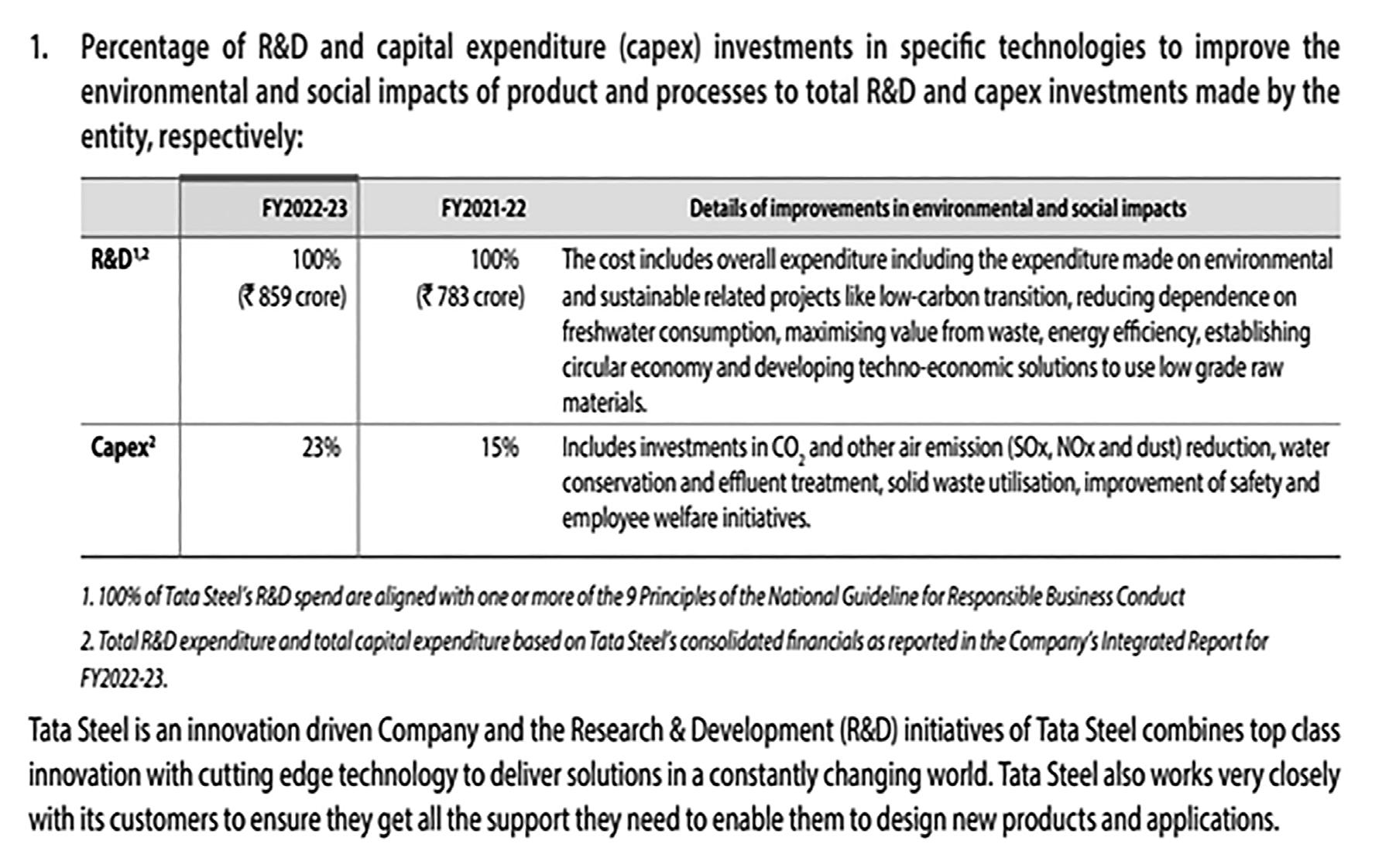
This principle prioritizes the well-being of employees and everyone involved in the value chain by emphasizing the necessity of fair wages, decent working conditions, and social protection. It also aims to eradicate child labour and forced labour, requiring organizations to adhere to labour laws and ensure health and safety standards in the workplace. This principle advocates for a supportive and secure working environment that upholds the dignity and rights of all workers.
The following extract from the annual report of a listed company outlines its compliance with the requirements of Principle 3:
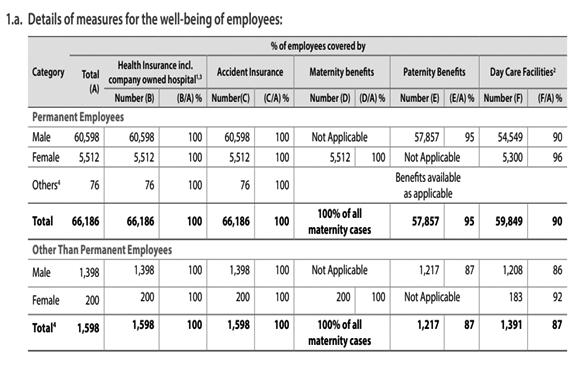
This principle emphasizes the importance of active engagement with stakeholders, urging organizations to listen to their concerns and consider their interests in decision-making processes. Organizations are also expected to maintain transparency, keeping stakeholders informed about how their operations and business decisions impact people and the environment. Additionally, this principle encourages businesses to fairly and transparently balance the occasionally conflicting needs of various stakeholders, ensuring that no group is disproportionately disadvantaged or overlooked.
Core Elements of Fourth Principle
Transparent policies and procedures
Identify the interested parties
Share benefits to the stakeholder
The following extract from the annual report of a listed company outlines its compliance with the requirements of Principle 4:
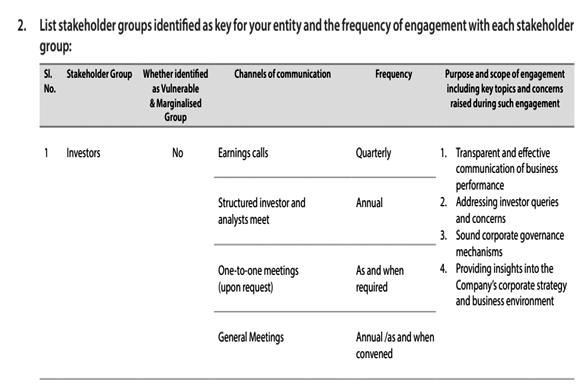
This principle addresses human rights concerns that arise directly or indirectly from business operations. Organizations are required to acknowledge and respect human rights in accordance with international standards, ensuring that their activities do not harm individuals or communities. This includes preventing discrimination, promoting equality, and safeguarding the dignity of all those affected by their operations. Additionally, this principle underscores the obligation of businesses not only to refrain from violating human rights but also to actively advocate for them within their sphere of influence.
The following extract from the annual report of a listed company outlines its compliance with the requirements of Principle 5:
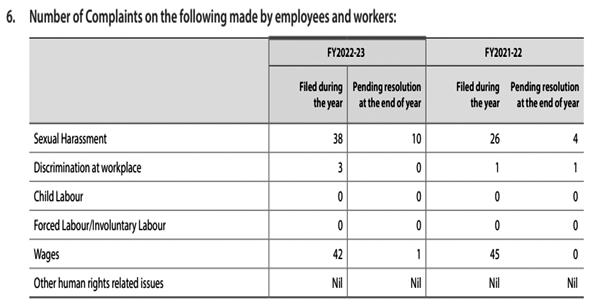
The organization should establish policies, procedures, and practices to assess and mitigate the environmental impacts caused by their business activities. They should also evaluate the environmental risks linked to their operations and implement measures to reduce these risks. Moreover, this principle promotes the restoration of ecosystems that have been damaged by business operations, emphasizing a commitment to protecting and preserving biodiversity.
Core Elements of Sixth Principle
Optimum use of natural and manmade resources
Measure the performance of environmental protection
Compare own activities with the industry best practices
The following extract from the annual report of a listed company outlines its compliance with the requirements of Principle 6:

This principle of the Business Responsibility and Sustainability Report (BRSR) emphasizes ethical engagement in influencing public and regulatory policies. Businesses are encouraged to ensure their actions are transparent and aligned with the public interest. This principle calls for organizations to integrate the core elements of BRSR comprehensively into their policy-making processes. It advocates for the promotion of policies that serve the public good rather than pursuing actions that benefit only their own interests.
The following extract from the annual report of a listed company outlines its compliance with the requirements of Principle 7:
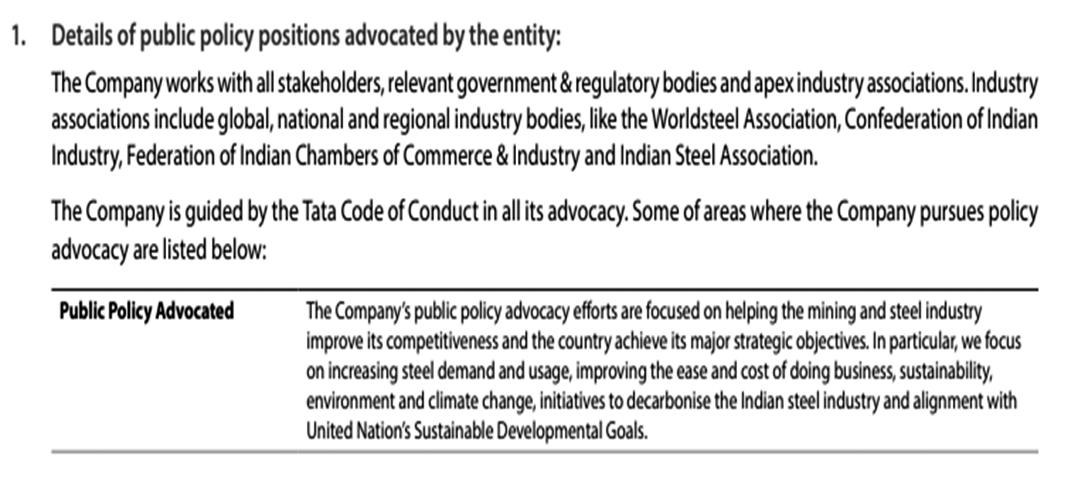
To promote inclusive growth and equitable development, the eighth principle emphasizes the need for collaboration among various stakeholders, including government bodies, businesses, and civil associations. This principle advocates for a unified approach where all parties work cohesively to improve livelihoods and support marginalized communities. Additionally, it calls for organizations to actively monitor, evaluate, and document the negative impacts of their activities
on society and the environment. Based on these assessments, they must develop and implement action plans to effectively mitigate these impacts, ensuring progress towards inclusive and equitable growth.
Identify impact of activity on social, clutural and economic aspects of people
Core Elements of Eigth Principle
Develop creative products and techonologies for better quality of life
Displacement or relocation of existing communities should not occur due to business
The following extract from the annual report of a listed company outlines its compliance with the requirements of Principle 8:
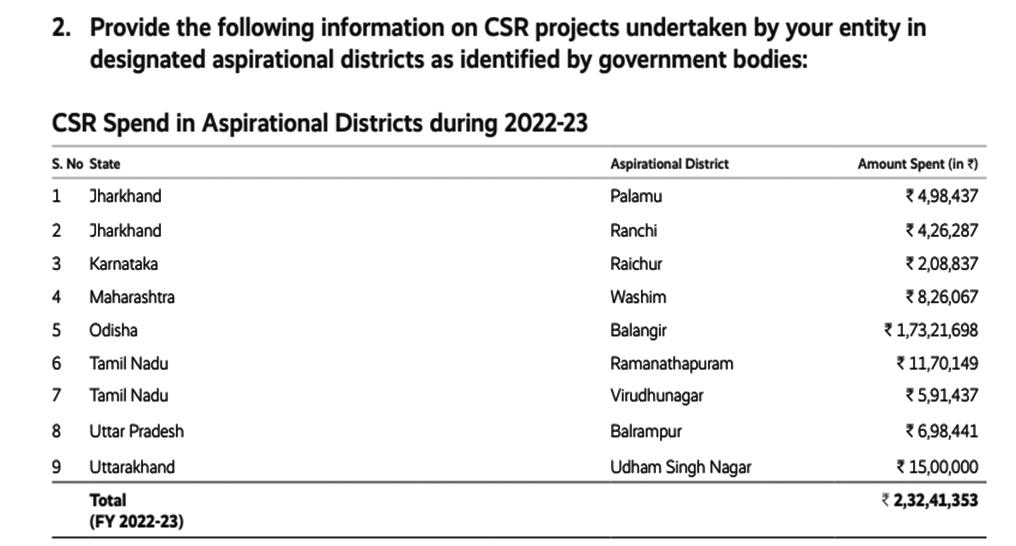
This principle underscores that the fundamental objective of any business is to offer valuable products or services to customers while earning reasonable profits. It stresses the importance of responsible conduct in all consumer interactions, ensuring product safety and reliability, and providing truthful information with fair pricing. This principle also mandates prompt and transparent handling of
consumer complaints. Moreover, it advocates for ethical marketing practices and the eradication of deceptive advertising, thereby fostering trust and loyalty among customers by prioritizing their best interests.
Reduce negative impacts of products and services on consumers
Core Elements of Ninth Principle
Transparent disclosure of all kinds impact to the user and environment
Privacy of customer needs to be maintained
The following extract from the annual report of a listed company outlines its compliance with the requirements of Principle 9:

Currently, the Securities and Exchange Board of India (SEBI) mandates that only the top 1000 listed companies integrate the Business Responsibility and Sustainability Report (BRSR) with their annual reports. However, it is anticipated that this requirement will soon be extended to other listed and unlisted companies. Given that the BRSR provides crucial sustainability-related information, the assurance of such reports is essential. This need for assurance will lead to the emergence of ESG (Environmental, Social, and Governance) audits.
An ESG audit is a process designed to help companies evaluate the environmental and social risks associated with their products, services, and operations. Additionally,
it aims to assist businesses in reviewing risks in their supply chains, enhancing risk management capabilities, and improving transparency with stakeholders.
In response to the growing necessity for BRSR report assurance, the Institute of Chartered Accountants of India (ICAI) has issued the Standard on Sustainability Assurance Engagements (SSAE) 3000, which pertains to Assurance Engagements on Sustainability Information. This standard provides a framework for assurance engagements on an entity’s sustainability information.
It is important to note the following effective dates for the application of SSAE 3000: a) On a voluntary basis for assurance reports covering periods ending on 31st March 2023. b) On a mandatory basis, assurance reports cover periods ending on or after 31st March 2024.
The evolution of sustainability reporting in India demonstrates an increasing commitment to transparency and responsible business practices. By adhering to the nine National Guidelines for Responsible Business Conduct (NGRBC) principles, Indian businesses are positioned to achieve sustainable development. For listed entities, adopting the Business Responsibility and Sustainability Report (BRSR) framework extends beyond compliance with regulatory requirements. It represents a significant opportunity to showcase their dedication to ethical and sustainable practices. This commitment not only fosters long-term value creation but also enhances societal well-being, marking a crucial step forward in the integration of sustainability into core business strategies.


Founded 1972


Evolution From a small family business to a leading technology-oriented Publishing/Product company


Expansion

Launch of Taxmann Advisory for personalized consulting solutions
Our Vision

Aim
Achieve perfection, skill, and accuracy in all endeavour

Growth
Evolution into a company with strong independent divisions: Research & Editorial, Production, Sales & Marketing, and Technology

Future
Continuously providing practical solutions through Taxmann Advisory
Editorial and Research Division
Over 200 motivated legal professionals (Lawyers, Chartered Accountants, Company Secretaries)
Monitoring and processing developments in judicial, administrative, and legislative fields with unparalleled skill and accuracy
Helping businesses navigate complex tax and regulatory requirements with ease

Over 60 years of domain knowledge and trust
Technology-driven solutions for modern challenges
Ensuring perfection, skill, and accuracy in every solution provided
Income Tax
Corporate Tax Advisory
Trusts & NGO Consultancy
TDS Advisory
Global Mobility Services
Personal Taxation
Training
Due Diligence
Due Dilligence
Advisory Services
Assistance in compounding of offences
Transactions Services
Investment outside India
Goods
Transaction Advisory
Business Restructuring
Classification
Due Diligence
Training
Advisory
Trade Facilitation Measures
Corporate
Corporate Structuring
VAT Advisory
Residential Status

Naveen Wadhwa
Research and Advisory [Corporate and Personal Tax]
Chartered Accountant (All India 24th Rank)
14+ years of experience in Income tax and International Tax
Expertise across real estate, technology, publication, education, hospitality, and manufacturing sectors
Contributor to renowned media outlets on tax issues

Vinod K. Singhania Expert on Panel | Research and Advisory (Direct Tax)
Over 35 years of experience in tax laws
PhD in Corporate Economics and Legislation
Author and resource person in 800+ seminars

V.S. Datey Expert on Panel | Research and Advisory [Indirect Tax]
Holds 30+ years of experience
Engaged in consulting and training professionals on Indirect Taxation
A regular speaker at various industry forums, associations and industry workshops
Author of various books on Indirect Taxation used by professionals and Department officials

Manoj Fogla Expert on Panel | Research and Advisory [Charitable Trusts and NGOs]
Over three decades of practising experience on tax, legal and regulatory aspects of NPOs and Charitable Institutions
Law practitioner, a fellow member of the Institute of Chartered Accountants of India and also holds a Master's degree in Philosophy
PhD from Utkal University, Doctoral Research on Social Accountability Standards for NPOs
Author of several best-selling books for professionals, including the recent one titled 'Trust and NGO's Ready Reckoner' by Taxmann
Drafted publications for The Institute of Chartered Accountants of India, New Delhi, such as FAQs on GST for NPOs & FAQs on FCRA for NPOs.
Has been a faculty and resource person at various national and international forums

the UAE
Chartered Accountant (All India 36th Rank)
Has previously worked with the KPMG

S.S. Gupta Expert on Panel | Research and Advisory [Indirect Tax]
Chartered Accountant and Cost & Works Accountant
34+ Years of Experience in Indirect Taxation
Bestowed with numerous prestigious scholarships and prizes
Author of the book GST – How to Meet Your Obligations', which is widely referred to by Trade and Industry

Sudha G. Bhushan Expert on Panel | Research and Advisory [FEMA]
20+ Years of experience
Advisor to many Banks and MNCs
Experience in FDI and FEMA Advisory
Authored more than seven best-selling books
Provides training on FEMA to professionals
Experience in many sectors, including banking, fertilisers, and chemical
Has previously worked with Deloitte
Taxmann Delhi
59/32, New Rohtak Road
New Delhi – 110005 | India
Phone | 011 45562222
Email | sales@taxmann.com
Taxmann Mumbai
35, Bodke Building, Ground Floor, M.G. Road, Mulund (West), Opp. Mulund Railway Station Mumbai – 400080 | Maharashtra | India
Phone | +91 93222 47686
Email | sales.mumbai@taxmann.com
Taxmann Pune
Office No. 14, First Floor, Prestige Point, 283 Shukrwar Peth, Bajirao Road, Opp. Chinchechi Talim, Pune – 411002 | Maharashtra | India
Phone | +91 98224 11811
Email | sales.pune@taxmann.com
Taxmann Ahmedabad
7, Abhinav Arcade, Ground Floor, Pritam Nagar Paldi
Ahmedabad – 380007 | Gujarat | India
Phone: +91 99099 84900
Email: sales.ahmedabad@taxmann.com
Taxmann Hyderabad
4-1-369 Indralok Commercial Complex Shop No. 15/1 – Ground Floor, Reddy Hostel Lane Abids Hyderabad – 500001 | Telangana | India
Phone | +91 93910 41461
Email | sales.hyderabad@taxmann.com
Taxmann Chennai No. 26, 2, Rajan St, Rama Kamath Puram, T. Nagar
Chennai – 600017 | Tamil Nadu | India
Phone | +91 89390 09948
Email | sales.chennai@taxmann.com
Taxmann Bengaluru
12/1, Nirmal Nivas, Ground Floor, 4th Cross, Gandhi Nagar
Bengaluru – 560009 | Karnataka | India
Phone | +91 99869 50066
Email | sales.bengaluru@taxmann.com
Taxmann Kolkata Nigam Centre, 155-Lenin Sarani, Wellington, 2nd Floor, Room No. 213
Kolkata – 700013 | West Bengal | India
Phone | +91 98300 71313
Email | sales.kolkata@taxmann.com
Taxmann Lucknow
House No. LIG – 4/40, Sector – H, Jankipuram Lucknow – 226021 | Uttar Pradesh | India
Phone | +91 97924 23987
Email | sales.lucknow@taxmann.com
Taxmann Bhubaneswar
Plot No. 591, Nayapalli, Near Damayanti Apartments
Bhubaneswar – 751012 | Odisha | India
Phone | +91 99370 71353
Email | sales.bhubaneswar@taxmann.com
Taxmann Guwahati
House No. 2, Samnaay Path, Sawauchi Dakshin Gaon Road
Guwahati – 781040 | Assam | India
Phone | +91 70866 24504
Email | sales.guwahati@taxmann.com